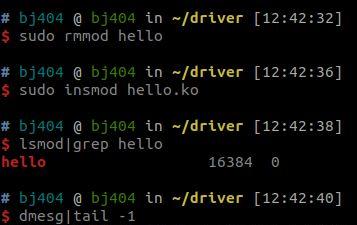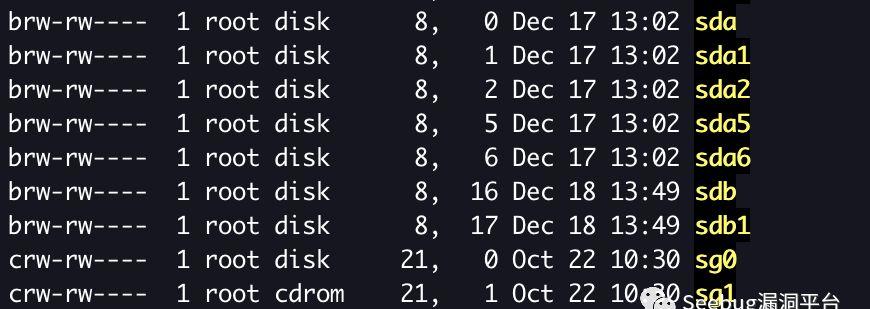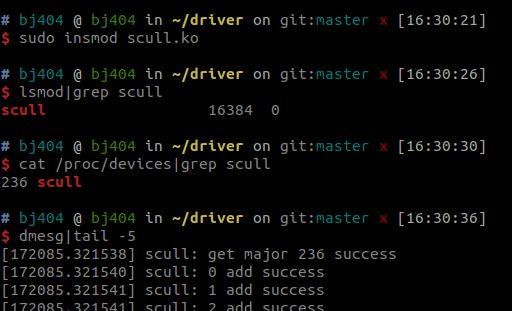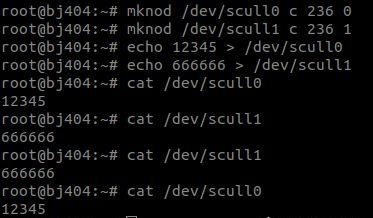
最近在搞IoT的时候,因为没有设备,模拟跑固件经常会缺/dev/xxx,所以我就开始想,我能不能自己写一个驱动,让固件能跑起来?因此,又给自己挖了一个很大坑,不管最后能不能达到我的初衷,能学到怎么开发Linux驱动,也算是有很大的收获了。
01
前 言
我写的这个系列以实践为主,不怎么谈理论,理论可以自己去看书,我是通过《Linux Device Drivers》这本书学的驱动开发,Github上有这本书中讲解的实例的代码[1]。
虽然我不想谈太多理论,但是关于驱动的基本概念还是要有的。Linux系统分为内核态和用户态,只有在内核态才能访问到硬件设备,而驱动可以算是内核态中提供出的API,供用户态的代码访问到硬件设备。
有了基本概念以后,我就产生了一系列的问题,而我就是通过我的这一系列的问题进行学习的驱动开发:
一切代码的学习都是从Hello World开始的,怎么写一个Hello World的程序?
驱动是如何在/dev下生成设备文件的?
驱动怎么访问实际的硬件?
因为我毕竟是搞安全的,我会在想,怎么获取系统驱动的代码?或者没有代码那能逆向驱动吗?驱动的二进制文件储存在哪?以后有机会可能还可以试试搞驱动安全。
02
Everything start from Hello World
提供我的Hello World代码[2]:
#include <linux/init.h>
#include <linux/module.h>
MODULE_LICENSE(“Dual BSD/GPL”);
MODULE_AUTHOR(“Hcamal”);
int hello_init(void)
{
printk(KERN_INFO “Hello World\n”);
return 0;
}
void hello_exit(void)
{
printk(KERN_INFO “Goodbye World\n”);
}
module_init(hello_init);
module_exit(hello_exit);
Linux下的驱动是使用C语言进行开发的,但是和我们平常写的C语言也有不同,因为我们平常写的C语言使用的是Libc库,但是驱动是跑在内核中的程序,内核中却不存在libc库,所以要使用内核中的库函数。
比如printk可以类比为libc中的printf,这是在内核中定义的一个输出函数,但是我觉得更像Python里面logger函数,因为printk的输出结果是打印在内核的日志中,可以使用dmesg命令进行查看
驱动代码只有一个入口点和一个出口点,把驱动加载到内核中,会执行module_init函数定义的函数,在上面代码中就是hello_init函数。当驱动从内核被卸载时,会调用module_exit函数定义的函数,在上面代码中就是hello_exit函数。
上面的代码就很清晰了,当加载驱动时,输出Hello World,当卸载驱动时,输出Goodbye World
PSS: printk输出的结果要加一个换行,要不然不会刷新缓冲区
编译驱动
驱动需要通过make命令进行编译,Makefile如下所示:
ifneq ($(KERNELRELEASE),)
obj-m := hello.o
else
KERN_DIR ?= /usr/src/linux-headers-$(shell uname -r)/
PWD := $(shell pwd)
default:
$(MAKE) -C $(KERN_DIR) M=$(PWD) modules
endif
clean:
rm -rf *.o *~ core .depend .*.cmd *.ko *.mod.c .tmp_versions
一般情况下,内核的源码都存在与/usr/src/linux-headers-$(shell uname -r)/目录下
比如:
$ uname -r
4.4.0-135-generic
/usr/src/linux-headers-4.4.0-135/ –> 该内核源码目录
/usr/src/linux-headers-4.4.0-135-generic/ –> 该内核编译好的源码目录
而我们需要的是编译好后的源码的目录,也就是/usr/src/linux-headers-4.4.0-135-generic/
驱动代码的头文件都需要从该目录下进行搜索
M=$(PWD)该参数表示,驱动编译的结果输出在当前目录下
最后通过命令obj-m := hello.o,表示把hello.o编译出hello.ko, 这个ko文件就是内核模块文件
加载驱动到内核
需要使用到的一些系统命令:
lsmod: 查看当前已经被加载的内核模块
insmod: 加载内核模块,需要root权限
rmmod: 移除模块
比如:
# insmod hello.ko // 把hello.ko模块加载到内核中
# rmmod hello // 把hello模块从内核中移除
旧版的内核就是使用上面这样的方法进行内核的加载与移除,但是新版的Linux内核增加了对模块的验证,当前实际的情况如下:
# insmod hello.ko
insmod: ERROR: could not insert module hello.ko: Required key not available
从安全的角度考虑,现在的内核都是假设模块为不可信的,需要使用可信的证书对模块进行签名,才能加载模块
解决方法用两种:
进入BIOS,关闭UEFI的Secure Boot
向内核添加一个自签名证书,然后使用证书对驱动模块进行签名,参考[3]
查看结果

03
在/dev下增加设备文件
同样先提供一份代码,然后讲解这份实例代码[4]
#include <linux/init.h>
#include <linux/module.h>
#include <linux/kernel.h> /* printk() */
#include <linux/slab.h> /* kmalloc() */
#include <linux/fs.h> /* everything… */
#include <linux/errno.h> /* error codes */
#include <linux/types.h> /* size_t */
#include <linux/fcntl.h> /* O_ACCMODE */
#include <linux/cdev.h>
#include <asm/uaccess.h> /* copy_*_user */
MODULE_LICENSE(“Dual BSD/GPL”);
MODULE_AUTHOR(“Hcamael”);
int scull_major = 0;
int scull_minor = 0;
int scull_nr_devs = 4;
int scull_quantum = 4000;
int scull_qset = 1000;
struct scull_qset {
void **data;
struct scull_qset *next;
};
struct scull_dev {
struct scull_qset *data; /* Pointer to first quantum set. */
int quantum; /* The current quantum size. */
int qset; /* The current array size. */
unsigned long size; /* Amount of data stored here. */
unsigned int access_key; /* Used by sculluid and scullpriv. */
struct mutex mutex; /* Mutual exclusion semaphore. */
struct cdev cdev; /* Char device structure. */
};
struct scull_dev *scull_devices; /* allocated in scull_init_module */
/*
* Follow the list.
*/
struct scull_qset *scull_follow(struct scull_dev *dev, int n)
{
struct scull_qset *qs = dev->data;
/* Allocate the first qset explicitly if need be. */
if (! qs) {
qs = dev->data = kmalloc(sizeof(struct scull_qset), GFP_KERNEL);
if (qs == NULL)
return NULL;
memset(qs, 0, sizeof(struct scull_qset));
}
/* Then follow the list. */
while (n–) {
if (!qs->next) {
qs->next = kmalloc(sizeof(struct scull_qset), GFP_KERNEL);
if (qs->next == NULL)
return NULL;
memset(qs->next, 0, sizeof(struct scull_qset));
}
qs = qs->next;
continue;
}
return qs;
}
/*
* Data management: read and write.
*/
ssize_t scull_read(struct file *filp, char __user *buf, size_t count,
loff_t *f_pos)
{
struct scull_dev *dev = filp->private_data;
struct scull_qset *dptr; /* the first listitem */
int quantum = dev->quantum, qset = dev->qset;
int itemsize = quantum * qset; /* how many bytes in the listitem */
int item, s_pos, q_pos, rest;
ssize_t retval = 0;
if (mutex_lock_interruptible(&dev->mutex))
return -ERESTARTSYS;
if (*f_pos >= dev->size)
goto out;
if (*f_pos count > dev->size)
count = dev->size – *f_pos;
/* Find listitem, qset index, and offset in the quantum */
item = (long)*f_pos / itemsize;
rest = (long)*f_pos % itemsize;
s_pos = rest / quantum; q_pos = rest % quantum;
/* follow the list up to the right position (defined elsewhere) */
dptr = scull_follow(dev, item);
if (dptr == NULL || !dptr->data || ! dptr->data[s_pos])
goto out; /* don’t fill holes */
/* read only up to the end of this quantum */
if (count > quantum – q_pos)
count = quantum – q_pos;
if (raw_copy_to_user(buf, dptr->data[s_pos] q_pos, count)) {
retval = -EFAULT;
goto out;
}
*f_pos = count;
retval = count;
out:
mutex_unlock(&dev->mutex);
return retval;
}
ssize_t scull_write(struct file *filp, const char __user *buf, size_t count,
loff_t *f_pos)
{
struct scull_dev *dev = filp->private_data;
struct scull_qset *dptr;
int quantum = dev->quantum, qset = dev->qset;
int itemsize = quantum * qset;
int item, s_pos, q_pos, rest;
ssize_t retval = -ENOMEM; /* Value used in “goto out” statements. */
if (mutex_lock_interruptible(&dev->mutex))
return -ERESTARTSYS;
/* Find the list item, qset index, and offset in the quantum. */
item = (long)*f_pos / itemsize;
rest = (long)*f_pos % itemsize;
s_pos = rest / quantum;
q_pos = rest % quantum;
/* Follow the list up to the right position. */
dptr = scull_follow(dev, item);
if (dptr == NULL)
goto out;
if (!dptr->data) {
dptr->data = kmalloc(qset * sizeof(char *), GFP_KERNEL);
if (!dptr->data)
goto out;
memset(dptr->data, 0, qset * sizeof(char *));
}
if (!dptr->data[s_pos]) {
dptr->data[s_pos] = kmalloc(quantum, GFP_KERNEL);
if (!dptr->data[s_pos])
goto out;
}
/* Write only up to the end of this quantum. */
if (count > quantum – q_pos)
count = quantum – q_pos;
if (raw_copy_from_user(dptr->data[s_pos] q_pos, buf, count)) {
retval = -EFAULT;
goto out;
}
*f_pos = count;
retval = count;
/* Update the size. */
if (dev->size < *f_pos)
dev->size = *f_pos;
out:
mutex_unlock(&dev->mutex);
return retval;
}
/* Beginning of the scull device implementation. */
/*
* Empty out the scull device; must be called with the device
* mutex held.
*/
int scull_trim(struct scull_dev *dev)
{
struct scull_qset *next, *dptr;
int qset = dev->qset; /* “dev” is not-null */
int i;
for (dptr = dev->data; dptr; dptr = next) { /* all the list items */
if (dptr->data) {
for (i = 0; i < qset; i )
kfree(dptr->data[i]);
kfree(dptr->data);
dptr->data = NULL;
}
next = dptr->next;
kfree(dptr);
}
dev->size = 0;
dev->quantum = scull_quantum;
dev->qset = scull_qset;
dev->data = NULL;
return 0;
}
int scull_release(struct inode *inode, struct file *filp)
{
printk(KERN_DEBUG “process %i (%s) success release minor(%u) file\n”, current->pid, current->comm, iminor(inode));
return 0;
}
/*
* Open and close
*/
int scull_open(struct inode *inode, struct file *filp)
{
struct scull_dev *dev; /* device information */
dev = container_of(inode->i_cdev, struct scull_dev, cdev);
filp->private_data = dev; /* for other methods */
/* If the device was opened write-only, trim it to a length of 0. */
if ( (filp->f_flags & O_ACCMODE) == O_WRONLY) {
if (mutex_lock_interruptible(&dev->mutex))
return -ERESTARTSYS;
scull_trim(dev); /* Ignore errors. */
mutex_unlock(&dev->mutex);
}
printk(KERN_DEBUG “process %i (%s) success open minor(%u) file\n”, current->pid, current->comm, iminor(inode));
return 0;
}
/*
* The “extended” operations — only seek.
*/
loff_t scull_llseek(struct file *filp, loff_t off, int whence)
{
struct scull_dev *dev = filp->private_data;
loff_t newpos;
switch(whence) {
case 0: /* SEEK_SET */
newpos = off;
break;
case 1: /* SEEK_CUR */
newpos = filp->f_pos off;
break;
case 2: /* SEEK_END */
newpos = dev->size off;
break;
default: /* can’t happen */
return -EINVAL;
}
if (newpos < 0)
return -EINVAL;
filp->f_pos = newpos;
return newpos;
}
struct file_operations scull_fops = {
.owner = THIS_MODULE,
.llseek = scull_llseek,
.read = scull_read,
.write = scull_write,
// .unlocked_ioctl = scull_ioctl,
.open = scull_open,
.release = scull_release,
};
/*
* Set up the char_dev structure for this device.
*/
static void scull_setup_cdev(struct scull_dev *dev, int index)
{
int err, devno = MKDEV(scull_major, scull_minor index);
cdev_init(&dev->cdev, &scull_fops);
dev->cdev.owner = THIS_MODULE;
dev->cdev.ops = &scull_fops;
err = cdev_add (&dev->cdev, devno, 1);
/* Fail gracefully if need be. */
if (err)
printk(KERN_NOTICE “Error %d adding scull%d”, err, index);
else
printk(KERN_INFO “scull: %d add success\n”, index);
}
void scull_cleanup_module(void)
{
int i;
dev_t devno = MKDEV(scull_major, scull_minor);
/* Get rid of our char dev entries. */
if (scull_devices) {
for (i = 0; i < scull_nr_devs; i ) {
scull_trim(scull_devices i);
cdev_del(&scull_devices[i].cdev);
}
kfree(scull_devices);
}
/* cleanup_module is never called if registering failed. */
unregister_chrdev_region(devno, scull_nr_devs);
printk(KERN_INFO “scull: cleanup success\n”);
}
int scull_init_module(void)
{
int result, i;
dev_t dev = 0;
/*
* Get a range of minor numbers to work with, asking for a dynamic major
* unless directed otherwise at load time.
*/
if (scull_major) {
dev = MKDEV(scull_major, scull_minor);
result = register_chrdev_region(dev, scull_nr_devs, “scull”);
} else {
result = alloc_chrdev_region(&dev, scull_minor, scull_nr_devs, “scull”);
scull_major = MAJOR(dev);
}
if (result < 0) {
printk(KERN_WARNING “scull: can’t get major %d\n”, scull_major);
return result;
} else {
printk(KERN_INFO “scull: get major %d success\n”, scull_major);
}
/*
* Allocate the devices. This must be dynamic as the device number can
* be specified at load time.
*/
scull_devices = kmalloc(scull_nr_devs * sizeof(struct scull_dev), GFP_KERNEL);
if (!scull_devices) {
result = -ENOMEM;
goto fail;
}
memset(scull_devices, 0, scull_nr_devs * sizeof(struct scull_dev));
/* Initialize each device. */
for (i = 0; i < scull_nr_devs; i ) {
scull_devices[i].quantum = scull_quantum;
scull_devices[i].qset = scull_qset;
mutex_init(&scull_devices[i].mutex);
scull_setup_cdev(&scull_devices[i], i);
}
return 0; /* succeed */
fail:
scull_cleanup_module();
return result;
}
module_init(scull_init_module);
module_exit(scull_cleanup_module);
知识点1 —— 驱动分类

驱动分为3类,字符设备、块设备和网口接口,上面代码举例的是字符设备,其他两种,之后再说。
如上图所示,brw-rw—-权限栏,b开头的表示块设备(block),c开头的表示字符设备(char)
知识点2 —— 主次编号
主编号用来区分驱动,一般主编号相同的表示由同一个驱动程序控制。
一个驱动中能创建多个设备,用次编号来区分。
主编号和次编号一起,决定了一个驱动设备。
如上图所示,
brw-rw—- 1 root disk 8, 0 Dec 17 13:02 sda
brw-rw—- 1 root disk 8, 1 Dec 17 13:02 sda1
设备sda和sda1的主编号为8,一个此编号为0一个此编号为1
知识点3 —— 驱动是如何提供API的
在我的概念中,驱动提供的接口是/dev/xxx,在Linux下Everything is File,所以对驱动设备的操作其实就是对文件的操作,所以一个驱动就是用来定义,打开/读/写/……一个/dev/xxx将会发生啥,驱动提供的API也就是一系列的文件操作。
有哪些文件操作?都被定义在内核<linux/fs.h>[5]头文件中,file_operations结构体
上面我举例的代码中:
struct file_operations scull_fops = {
.owner = THIS_MODULE,
.llseek = scull_llseek,
.read = scull_read,
.write = scull_write,
.open = scull_open,
.release = scull_release,
};
我声明了一个该结构体,并赋值,除了owner,其他成员的值都为函数指针
之后我在scull_setup_cdev函数中,使用cdev_add向每个驱动设备,注册该文件操作结构体
比如我对该驱动设备执行open操作,则会去执行scull_open函数,相当于hook了系统调用中的open函数
知识点4 —— 在/dev下生成相应的设备
对上面的代码进行编译,得到scull.ko,然后对其进行签名,最后使用insmod加载进内核中
查看是否成功加载:

虽然驱动已经加载成功了,但是并不会在/dev目录下创建设备文件,需要我们手动使用mknod进行设备链接:

04
总 结
在该实例中,并没有涉及到对实际物理设备的操作,只是简单的使用kmalloc在内核空间申请一块内存。代码细节上的就不做具体讲解了,都可以通过查头文件或者用Google搜出来。
在这里分享一个我学习驱动开发的方法,首先看书把基础概念给弄懂,细节到需要用到的时候再去查。
比如,我不需要知道驱动一共能提供有哪些API(也就是file_operations结构都有啥),我只要知道一个概念,驱动提供的API都是一些文件操作,而文件操作,目前我只需要open, close, read, write,其他的等有需求,要用到的时候再去查。
??
参 考 链 接
https://github.com/jesstess/ldd4
https://raw.githubusercontent.com/Hcamael/Linux_Driver_Study/master/hello.c
https://jin-yang.github.io/post/kernel-modules.html
https://raw.githubusercontent.com/Hcamael/Linux_Driver_Study/master/scull.c
https://raw.githubusercontent.com/torvalds/linux/master/include/linux/fs.h

往 期 热 门
Thinkphp5 远程代码执行漏洞事件分析报告
lucky 勒索病毒分析与文件解密
Discuz x3.4 前台 SSRF 分析











